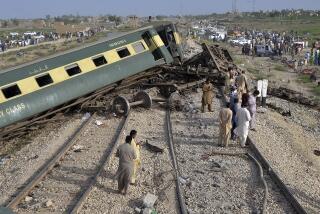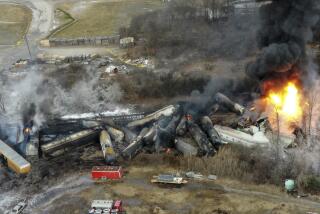Engineer Stopped to Use Phone; Train Toll at 33 : Lack of a Radio Cited in London Crash
- Share via
LONDON — One of Britain’s worst postwar rail tragedies might have been prevented if an older train that was involved had been equipped with a two-way radio such as those now used on a majority of the rolling stock of state-owned British Rail Corp., a senior company official said Tuesday.
The engineer of the lead train involved in Monday’s fatal south London crash had stopped near one of the world’s busiest rail junctions to use a trackside telephone, reportedly to notify headquarters of a malfunctioning signal.
Unaware of the stationary train ahead, a second commuter train rounded a bend in the track at a reported 40-50 m.p.h. and slammed into it, killing 33 people and injuring more than 120.
Toll Revised Downward
Originally, officials had given the death toll as 36, but they revised that downward Tuesday, explaining that it had been difficult to be accurate because of “the nature of the injuries.” Some of the bodies were dismembered, either in the original crash or when the wreckage was hit by a third, almost empty train.
A British Rail spokesman refused to comment on reports of a malfunctioning signal, other than to reiterate that “a preliminary investigation indicates that the probable cause of the tragic rail accident was a technical fault following preparatory work in connection with the Waterloo (area) resignaling scheme.”
But Gordon Pettitt, general manager of the company’s southern region, when asked Tuesday by Britain’s Independent Television News whether a radio in the lead train might have prevented the tragedy, said: “I think it’s likely that it may have avoided it, and it certainly may have avoided such serious results.”
Pettitt said a British Rail inquiry into the crash, expected to report its conclusions today, will consider whether the company should speed up a program to equip most trains with two-way radios. The current deadline is about 16 months away. The British Rail probe is to be followed by a full-scale government inquiry.
‘Ridiculous,’ Official Says
Transportation Secretary Paul Channon said it is “ridiculous” that many British trains do not have two-way radios, which are a standard feature on the separate London subway system.
Analysts said here Tuesday that engineer Alex McClymont would not have had to stop his train on the busy stretch of track in order to report the signal failure, and John Rolls, the engineer of the following train, could have easily been alerted in time.
Rolls, 54, was killed in the accident.
There were differing reports here Tuesday on the nature of the signaling malfunction that triggered the crash. British Broadcasting Corp. television said a signal light near the busy Clapham Junction flashed yellow, green and red in haphazard sequence. But a drivers’ union report quoted McClymont as saying that he had been passing green lights until a signal suddenly switched to red.
Either signaling pattern would indicate a fault in the system, in which lights lining the track at regular intervals are supposed to beam one color at a time and be coordinated with each other. A red signal should always be preceded by one several hundred yards farther back showing yellow, and another behind that showing double yellow. The system is supposed to be fail-safe.
The entire signaling system in the area of Monday’s accident is being modernized, and there were unconfirmed reports that faulty wiring between the new and old systems might have caused the signal to malfunction.
Payments Planned
British Rail has accepted full responsibility for the tragedy and said Tuesday that it will make initial payments equal to about $3,700 to help victims and their families who may be in immediate need.
Both Prime Minister Margaret Thatcher and the Duchess of York visited injured survivors in the hospital Tuesday.
The crash was the worst rail disaster, train or subway, in Britain since 1975, when 43 people were killed in a subway crash. It was the worst accident on the British Rail system since a 1967 south London collision in which 49 people died.
More to Read
Sign up for Essential California
The most important California stories and recommendations in your inbox every morning.
You may occasionally receive promotional content from the Los Angeles Times.













